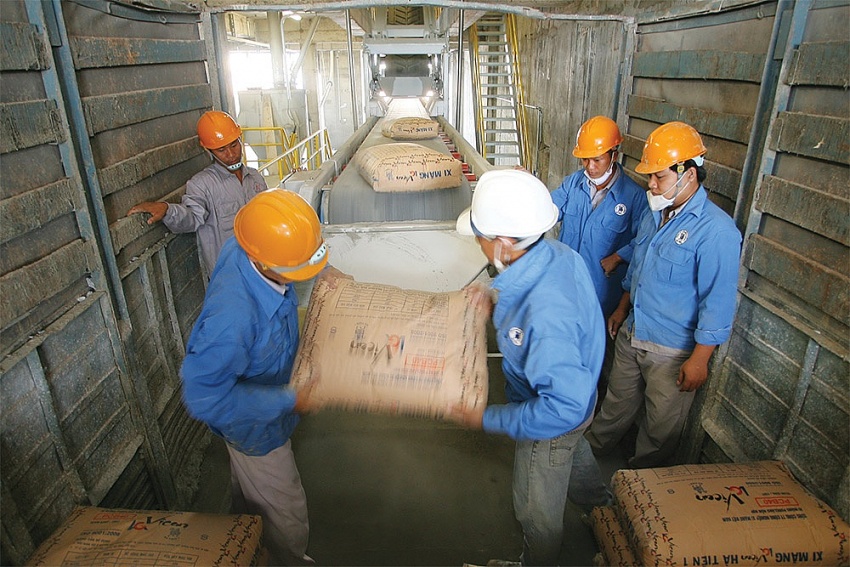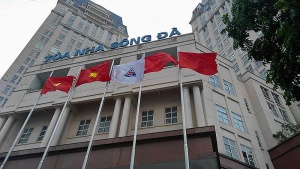Equitisation pace thwarts robust growth
In its report on Vietnam’s socioeconomic situation read out at the National Assembly (NA) last week, the government stated that it will continue effectively implementing schemes on restructuring the investment, business, and production strategies of state-owned groups and corporations, while actively engaging in and carrying out large-scale projects with spillover effects.
 |
| Not enough state-owned groups have either been equitised or divested in recent times, Photo: Le Toan |
The government will also “focus on dealing with enterprises and projects which poorly perform with long-lasting losses,” the report said.
According to the Ministry of Planning and Investment (MPI), since last year, state-owned enterprise (SOE) equitisation remains very slow.
“Divestment of many SOEs has faced many difficulties due to procedural obstructions. A number of SOEs and projects that have been heavily funded by the state have suffered from losses with ineffective operations,” the MPI stated in a report sent to the NA Economic Committee two weeks ago.
For example, member companies of Vietnam Cement Industry Corporation has suffered from a loss of nearly $12.5 million, with below-zero profit of $6 million. Meanwhile, Nghi Son Refinery and Petrochemical has been facing the danger of stopped operations due to failure in restructuring plans.
In addition, the project of developing the Hanoi Science and Technology University financed by the Asian Development Bank has been delayed for 12 years, the MPI stated.
According to the Ministry of Finance’s Agency for Corporate Finance, as of late April, 85 SOEs had their restructuring schemes approved by authorised agencies since 2022. These 85 enterprises include 22 centrally managed enterprises and 63 locally managed businesses.
The 22 enterprises include many big names such as Petrolimex, Vietnam Maritime Corporation, Vinacomin, PetroVietnam, Vinachem, MobiFone, and Vietnam Air Traffic Management Corporation.
In 2023, 76 enterprises had their restructuring schemes approved, and the figure was nine in the first four months of this year.
Meanwhile, no SOE was equitised, and only four SOEs were divested, with $6.2 million collected – including more than $5.8 million from Song Hong Corporation, managed by the Ministry of Construction.
Previously in November 2022, the prime minister enacted Decision No.1479/QD-TTg on reshuffling SOEs and those with state capital in the 2022–2025 period.
Under a decision made late in 2022, Vietnam must see the equitisation of 19 SOEs before the end of 2025, including some big ones such as Housing and Urban Development Corporation and Agribank. The government also required the divestment of over 140 enterprises, including names such as Construction Machinery Corporation, Song Hong Corporation, LILAMA Corporation, and VTVcab.
Due to slow-paced divestment and equitisation, the 2021-2022 period saw the collection from this process of $200 million, reaching only 8 per cent of the prime minister’s assigned plan worth $2.5 billion.
Last November, the government admitted at the NA that Vietnam’s efforts to restructure SOEs were quite slow, failing to meet expectations, meaning plans to attract private investment and ameliorate the economy’s competitiveness were being thwarted.
“The speed of SOE equitisation and divestment has continued to be slower than planned. The number of enterprises slated for equitisation and divestment remains humble, and the number of those enterprises having their restructuring schemes approved also remains minimal,” stated a government report on the issue submitted to the NA at that time.
NA deputy Tran Hoang Ngan representing Ho Chi Minh City strongly urged the government to clarify and quicken the reform of SOEs as soon as possible.
“The restructuring, arrangement, and renewal of SOEs and state-owned units have failed to meet the requirements. It is necessary to promote strong restructuring of state-run groups, corporations, and SOEs, quickly handling inefficient enterprises, and further promoting the role of groups, corporations, and SOEs in implementing major national projects,” Ngan said.
“More capital must also be invested into the economy’s key industries related to materials, metallurgy, and mechanics.”
Minister of Planning and Investment Nguyen Chi Dung underlined that despite advantages, the process of restructuring SOEs in Vietnam still has many limitations, not ensuring both quality and quantity.
“Corporate governance innovation in production and business operations remains slow, not really oriented towards good international principles and practices, and not in line with a modern market economy,” he said.
“The remuneration regime and handling responsibility for state employees fail to create motivation associated with responsibility under the market mechanism.”
According to Minister of Finance Ho Duc Phoc, the inadequate policies for managing SOEs remain a major cause behind their slow innovation and confusion in formulating business and investment strategies and plans.
“Besides that, policies on salary and remuneration remain unattractive for SOEs to attract high-quality human resources. The legal framework for management and usage of state capital at SOEs should be reviewed and improved in line with the amendments to the Law on Bidding and the Law on Land to ensure efficiency,” Phoc said.
 | How to get ahead with SOE equitisation in Vietnam In recent years, the Vietnamese government has made great efforts to promote state-owned enterprise (SOE) equitisation as the obvious solution for the development of the economy, but the process has not been completed as scheduled. Nevertheless, the circumstances create opportunities on both legal and practical aspects. |
 | Japanese players keen on state-owned equitisations With strong financial potential, technological advantages, and cultural similarities, Japanese investors are keen on participating in the restructuring and equitisation of state-owned enterprises in Vietnam. |
 | Vietnam intensifies scrutiny of construction equitisation Vietnam's government is urging state-owned construction firms and associated regulatory authorities to stringently enforce audit conclusion 1229, aimed at rectifying potential transgressions in the equitisation process and prevention of state asset losses. |
What the stars mean:
★ Poor ★ ★ Promising ★★★ Good ★★★★ Very good ★★★★★ Exceptional
Related Contents
Latest News
More News
- Vietnam, New Zealand seek level-up in ties (February 19, 2026 | 18:06)
- Untapped potential in relations with Indonesia (February 19, 2026 | 17:56)
- German strengths match Vietnamese aspirations (February 19, 2026 | 17:40)
- Kim Long Motor and AOJ Suzhou enter strategic partnership (February 16, 2026 | 13:27)
- Haiphong welcomes long-term Euro investment (February 16, 2026 | 11:31)
- VIFC in Ho Chi Minh City officially launches (February 12, 2026 | 09:00)
- Norfund invests $4 million in Vietnam plastics recycling (February 11, 2026 | 11:51)
- Marico buys 75 per cent of Vietnam skincare startup Skinetiq (February 10, 2026 | 14:44)
- SCIC general director meets with Oman Investment Authority (February 10, 2026 | 14:14)
- G42 and Vietnamese consortium to build national AI infrastructure (February 09, 2026 | 17:32)

 Tag:
Tag:
















 Mobile Version
Mobile Version